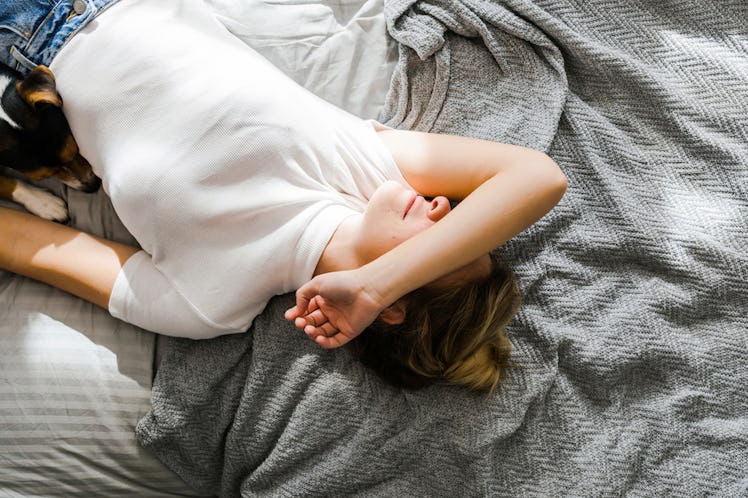
This Is The One Thing Missing From Your Bedtime Routine, According To A Sleep Expert
Your bedroom is your sanctuary, so it follows that you should keep things as clean and clutter-free as possible to preserve that sacred space. This is especially true when it comes to sleep, since getting a good night's rest is one of the best things you can do for your body. A comfortable, clean bed makes for a happy, rested human being — but does making your bed actually help you sleep better?
Next to proper hydration and nutrition, sleep is one of the most important factors for good health. According to the National Sleep Foundation, you should be aiming for at least seven to eight hours of sleep each night, if not more. When you don't get enough sleep, or the quality of your rest isn't so great (meaning you don't reach those deeper stages of your REM cycle), it can easily lead to symptoms of fatigue, and possibly even sleep deprivation, which might include headaches, sore muscles, dizziness, and forgetfulness, according to the Better Health Channel.
While there doesn't appear to be any scientific evidence to show a direct link between making your bed and enjoying a better snooze, there are some potential, indirect effects happening here that might contribute to getting a good night's sleep. According to Carl Johan Hederoth, CEO of Northcube and the creator of Sleep Cycle, making your bed is beneficial from both a hygienic and a habitual perspective.
"The habit of getting into a made bed improves your bedtime routine and decreases stress that messy bedrooms can cause before going to bed," Hederoth tells Elite Daily.
Creating a healthy set of bedtime routines (like taking the time to make your bed) can definitely make it a bit easier to fall asleep at night. Some other habits you could adopt for a better rest include taking a hot shower, drinking decaffeinated tea, or reading a good book. Ideally, your bedtime activities should include things that calm you down and lower your heart rate so your body knows it's time to wind down for the day. Coming home to a made bed and a clean room, according to Hederoth, will help accomplish this, and will certainly be less stressful to come home to than a tornado-swept mess of a bedroom.
Hederoth also suggests something that might sound a little bit counterintuitive: waiting to make your bed until later on in the day, rather than doing it as soon as you wake up.
"Don’t make your bed right away after you get up in the morning," he tells Elite Daily. Instead, Hederoth suggests letting your sheets breathe and cool down a little bit. "This will keep the bed environment fresh for longer," he explains, which also might mean you won't have to wash your sheets as much, which is obviously a total win.
Another factor that you might not have considered: how clean your bedroom is. Hederoth advises limiting the dust that piles up in your bedroom to keep stress at a minimum, and thus promote better sleep.
Keeping your whole bedroom clean and dust-free will extend the freshness of your sheets in between washes, and ultimately, contribute to more peaceful sleep, according to Hederoth.
Keep in mind, these suggestions probably won't radically change the quality of your sleep overnight, but they're small, easy steps you can take toward improving your snooze. Plus, come on, you know deep down you could be a little more on top of cleaning your room, and this could be your incentive to make it a real priority moving forward.
If, despite your best efforts, you're still having a hard time falling or staying asleep throughout the night, it might be time to look elsewhere for solutions. Consider other factors in your day-to-day routine, like the foods you're eating or how much caffeine you're consuming, especially in the second half of the day. A 2013 study published in the Journal of Clinical Sleep Medicine revealed that drinking a caffeinated beverage like coffee six hours before bedtime can reduce your sleep by up to a whole freaking hour. In other words, ditch the caffeine after about 3 p.m. or so to make sure it's not robbing you of that precious time under the covers.
Keeping your bed clean and tidy is never a bad idea, but your overall sleep health should always be treated like the monumentally important thing that it is. If you find that tweaking your daily habits isn't helping you sleep, be sure to talk to a health professional ASAP so you can get the rest you not only need, but deserve.